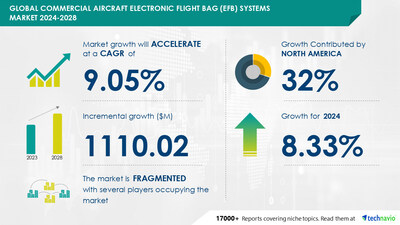Commercial Aircraft Electronic Flight Bag (EFB) Systems Market size is set to grow by USD 1110.02 mn from 2024-2028, use of advanced avionics systems for commercial aircraft to boost the market growth, Technavio
Press Releases
May 15, 2024
NEW YORK, May 15, 2024 /PRNewswire/ — The global commercial aircraft electronic flight bag (efb) systems market size is estimated to grow by USD 1110.02 mn from 2024-2028, according to Technavio. The market is estimated to grow at a CAGR of 9.05% during the forecast period.
For more insights on the forecast market size and historic data (2018 – 2022) – Download Free sample report in a minutes
|
Forecast period |
2024-2028 |
|
Base Year |
2023 |
|
Historic Data |
2018 – 2022 |
|
Segment Covered |
Type (Class I/ABC, Class II/ABC, and Class III/ABC), Application (Narrow-body aircraft, Wide-body aircraft, and Regional jet), and Geography (North America, APAC, Europe, Middle East and Africa, and South America) |
|
Region Covered |
North America, APAC, Europe, Middle East and Africa, and South America |
|
Key companies profiled |
Airbus SE, Anuvu Operations LLC, Astronautics Corp. Of America, Astronics Corp., Carlisle Companies Inc., Collins Aerospace, Deutsche Lufthansa AG, Honeywell International Inc., L3Harris Technologies Inc., Teledyne Technologies Inc., Thales Group, Viasat Inc., Apprimus Informatik GmbH, CMC Electronics Inc., DextraData GmbH, International Flight Support, and Keyzo IT Solutions Ltd. |
Key Market Trends Fueling Growth
Commercial Aircraft Electronic Flight Bag (EFB) systems market is experiencing significant growth due to technological advances in aviation connectivity. New features, such as flight logs, airport information, and operational manuals in digital format, are enhancing pilot operations. Portable devices are emerging as alternatives to integrated avionics, bringing technical complications. Proper certifications from aviation agencies are mandatory for EFBs and other devices. The market includes flight logs, airport information, operational manuals, aeronautical charts, route information, aircraft weight, fuel economy, airspace systems, airports, commercial airplanes, procedures, and certifications. Aircraft weight reduction and fuel efficiency are key focus areas in the aviation industry. EFB manufacturers are developing predictive technologies for aircraft deliveries and IOS devices for fuel-saving potentials and operating efficiency. The market encompasses fixed wing aircraft, rotary wing aircraft, electric propulsion technologies, and software revision processes.
Market Challenges
The commercial aircraft Electronic Flight Bag (EFB) market is experiencing significant growth due to the integration of advanced software applications in the aerospace industry. These systems enable real-time analysis of flight data, leading to reduced operational costs. Components manufacturers are upgrading software and adding features, such as UTC Aerospace Systems’ OpsInsight Electronic Flight Folder. This iPad application offers pre-flight planning, NOTAM reviews, in-flight performance comparisons, and access to aeronautical charts, operational manuals, airport information, and weather data. EFBs enhance fuel efficiency, operational efficiency, and cockpit operations, making them essential for commercial aviation, next-generation aircraft, and airline fleets.
* Major airlines have been the primary adopters of Electronic Flight Bag (EFB) systems due to the applicability offered by installed or portable EFB devices.
* Small airline companies have been hesitant to utilize EFB technology to its full potential.
* Some of these airlines are now considering implementing EFB systems, while others are still in the process of understanding the fundamental features of EFB technology.
* These airlines have not fully embraced wireless technology to enhance customer service and operational efficiency.
* Once fully adopted, EFB systems will significantly improve service performance in terms of both operational reliability and customer service.
* Flight technicians, ground engineers, and flight attendants will be able to perform their functions more efficiently with the help of EFB systems.
* The adoption of basic commercial EFB system functionalities, such as flight information and control tools, will initially hinder the growth of the global commercial aircraft EFB systems market during the forecast period.
* However, as more airlines adopt advanced EFB system functionalities, the market is expected to experience substantial growth.
* Keywords: EFB systems, major airlines, small airline companies, operational reliability, customer service, wireless technology, flight technicians, ground engineers, flight attendants, global commercial aircraft EFB systems market.
Research report provides comprehensive data on impact of trend, driver and challenges – Buy Report
Segment Overview
This commercial aircraft electronic flight bag (efb) systems market report extensively covers market segmentation by
- Type
- 1.1 Class I/ABC
- 1.2 Class II/ABC
- 1.3 Class III/ABC
- Application
- 2.1 Narrow-body aircraft
- 2.2 Wide-body aircraft
- 2.3 Regional jet
- Geography
- 3.1 North America
- 3.2 APAC
- 3.3 Europe
- 3.4 Middle East and Africa
- 3.5 South America
1.1 Class I/ABC- The Commercial Aircraft Electronic Flight Bag (EFB) market is segmented based on the type of systems used, including Flight logs, Airport information, Operational manuals, Aeronautical charts, Route information, and other reference materials. These EFB systems are primarily used by pilots in commercial airplanes, helicopters, and eVTOL vehicles to enhance operational efficiency and reduce the reliance on paper airplane bags. The systems are limited to providing supplementary information and are not intended to replace existing systems. They are considered controlled portable electronic devices (PEDs) and require regulatory certifications for usage in the cockpit. EFB systems provide essential information such as aircraft weight, fuel economy, and airspace system details. They are portable and connected to a certified power source in the aircraft, without being attached to a mounting device. The market for these systems is significant in the aviation industry, contributing to revenue through air transportation and fuel-efficient air fleets. EFB manufacturers focus on developing software revision processes and integrating predictive technologies to improve fleet performance computations and fuel savings. Certifications for EFB hardware require assessments of device usage in the cockpit, electromagnetic interference, and lithium battery operation. The market for these systems is expanding, with IOS devices and pilot operations becoming increasingly popular. Aircraft manufacturing companies are integrating EFB systems into their aircraft deliveries to meet the demands of the aviation industry and air traffic. The market for EFB systems is expected to grow as the industry shifts towards electric propulsion technologies and the integration of fixed-wing and rotary-wing aircraft.
For more information on market segmentation with geographical analysis including forecast (2024-2028) and historic data (2018 – 2022) – Download a Sample Report
Research Analysis
The Commercial Aircraft Electronic Flight Bag (EFB) Systems Market encompasses advanced technologies designed to enhance aviation operations. These systems integrate various functionalities such as flight logs, airport information, operational manuals, aeronautical charts, route information, and weather data. Pilots utilize EFBs on both fixed-wing and rotary-wing aircraft, including helicopters and eVTOL vehicles, to optimize fuel efficiency and improve overall aircraft performance. EFBs enable real-time access to essential data, ensuring crew members are well-informed and prepared for various flight scenarios. Electric propulsion technologies play a significant role in the evolution of EFB systems, offering improved fuel economy and reduced environmental impact.
Market Research Overview
The Commercial Aircraft Electronic Flight Bag (EFB) Systems market refers to the provision of advanced digital solutions that replace traditional paper-based flight documentation and navigation tools. These systems enable pilots to access real-time data, weather information, navigation charts, and other essential aviation data during flights. EFBs offer significant benefits such as increased operational efficiency, reduced fuel consumption, and improved safety. The market is driven by the growing adoption of digital technologies in the aviation industry and the increasing demand for real-time data access during flights. The market also includes various applications such as electronic flight manuals, electronic charts, and performance data analysis tools. The future of the EFB Systems market looks promising with the ongoing development of advanced technologies like Artificial Intelligence and Machine Learning, which are expected to revolutionize the way pilots operate and make informed decisions during flights.
Table of Contents:
1 Executive Summary
2 Market Landscape
3 Market Sizing
4 Historic Market Size
5 Five Forces Analysis
6 Market Segmentation
- Type
- Class I/ABC
- Class II/ABC
- Class III/ABC
- Application
- Narrow-body Aircraft
- Wide-body Aircraft
- Regional Jet
- Geography
- North America
- APAC
- Europe
- Middle East And Africa
- South America
7 Customer Landscape
8 Geographic Landscape
9 Drivers, Challenges, and Trends
10 Company Landscape
11 Company Analysis
12 Appendix
About Technavio
Technavio is a leading global technology research and advisory company. Their research and analysis focuses on emerging market trends and provides actionable insights to help businesses identify market opportunities and develop effective strategies to optimize their market positions.
With over 500 specialized analysts, Technavio’s report library consists of more than 17,000 reports and counting, covering 800 technologies, spanning across 50 countries. Their client base consists of enterprises of all sizes, including more than 100 Fortune 500 companies. This growing client base relies on Technavio’s comprehensive coverage, extensive research, and actionable market insights to identify opportunities in existing and potential markets and assess their competitive positions within changing market scenarios.
Contacts
Technavio Research
Jesse Maida
Media & Marketing Executive
US: +1 844 364 1100
UK: +44 203 893 3200
Email: [email protected]
Website: www.technavio.com/
![]() View original content to download multimedia:https://www.prnewswire.com/news-releases/commercial-aircraft-electronic-flight-bag-efb-systems-market-size-is-set-to-grow-by-usd-1110-02-mn-from-2024-2028–use-of-advanced-avionics-systems-for-commercial-aircraft-to-boost-the-market-growth-technavio-302145176.html
View original content to download multimedia:https://www.prnewswire.com/news-releases/commercial-aircraft-electronic-flight-bag-efb-systems-market-size-is-set-to-grow-by-usd-1110-02-mn-from-2024-2028–use-of-advanced-avionics-systems-for-commercial-aircraft-to-boost-the-market-growth-technavio-302145176.html
SOURCE Technavio




